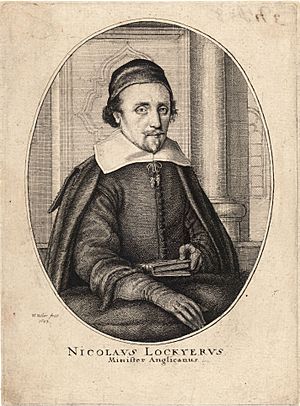Nicholas Lockyer facts for kids
Nicholas Lockyer (born 1611, died 1685) was an English church leader and a type of Protestant minister called an Independent. He was a strong supporter of Oliver Cromwell, who was a very important leader in England at that time. Nicholas Lockyer even became the head of Eton College, a famous school. Later in his life, he was removed from his church roles because he didn't agree with the new rules for churches. He became known as a nonconformist.

Contents
Nicholas Lockyer's Story
Early Life and Career
Nicholas Lockyer was born in 1611 in Glastonbury, England. He went to New Inn Hall at Oxford University in 1631. He earned his first degree there in 1633. Later, he continued his studies at Emmanuel College in Cambridge, getting his master's degree in 1636.
When the First English Civil War began, Nicholas Lockyer supported the Parliament's side. He signed an agreement called the Solemn League and Covenant, which was a promise to support the Parliament and a certain way of running the church. He became known as a very powerful and passionate preacher. He was often asked to give special sermons to the House of Commons, which was part of the English Parliament.
Working with Oliver Cromwell
Oliver Cromwell, who became England's leader, made Nicholas Lockyer his personal chaplain (a minister who serves a leader). In 1650, Cromwell appointed him as a fellow at Eton College. In 1651, Lockyer was sent to Scotland to preach alongside government officials.
In 1653, Nicholas Lockyer was a preacher at Whitehall in London. He was chosen to be part of a group that would approve public preachers. In 1659, he became the Provost of Eton College, which means he was the head of that famous school.
Challenges and Later Years
After the king returned to power in 1660 (this was called the Restoration), Nicholas Lockyer was removed from his position at Eton. He also lost his jobs as a preacher in London because he refused to follow the new church laws, especially the Uniformity Act 1662. This act required ministers to use the official prayer book and follow certain rules.
Because he kept preaching without following the new rules, he had to leave England for a while. In 1666, he went to Rotterdam in the Netherlands. In 1670, he had to leave the country again because he secretly published a pamphlet against a new law that made it harder for nonconformists to meet.
Nicholas Lockyer continued to preach until the end of his life. He settled in Woodford, Essex, where he died on March 13, 1685. He was buried in St. Mary, Whitechapel. He had a son named Cornelius and five daughters.
Nicholas Lockyer also became quite wealthy during his lifetime. In 1653, the government decided to give him land worth £200 a year. He chose to take the money instead, receiving £2,100. With this money, he bought land in Worcestershire. He also owned property in Woodford and Barking, and even some land in Munster, Ireland.
What He Wrote
Nicholas Lockyer published several books and sermons. Here are some of his important works:
- Christ's Communion with his Church Militant (1644): This book was about how Jesus connects with his church.
- A Divine Discovery of Sincerity (1643): This work explored what it means to be truly sincere.
- Baulme for Bleeding England and Ireland (1644): This book offered comfort and advice for Christians facing hard times during the wars.
In 1651, Lockyer gave a sermon in Edinburgh, Scotland, about how a church should be organized. He later published it as A little Stone out of the Mountain: Church Order briefly opened (1652). This book upset some Scottish church leaders, who disagreed with his ideas. One professor even wrote a book to argue against Lockyer's views.
Other writings by Nicholas Lockyer include:
- England faithfully watch't with in her Wounds (1646): A collection of sermons.
- An Olive Leaf, or a Bud of the Spring (1650): About the resurrection of Jesus.
- A Memorial of God's Judgments (1671): Sermons meant to help people remember God's actions.
- Spiritual Inspection, or a Review of the Heart.
- The Young Man's Call and Duty.
He also published two sermons that he gave to the House of Commons in 1646 and 1659.
 | Percy Lavon Julian |
 | Katherine Johnson |
 | George Washington Carver |
 | Annie Easley |

